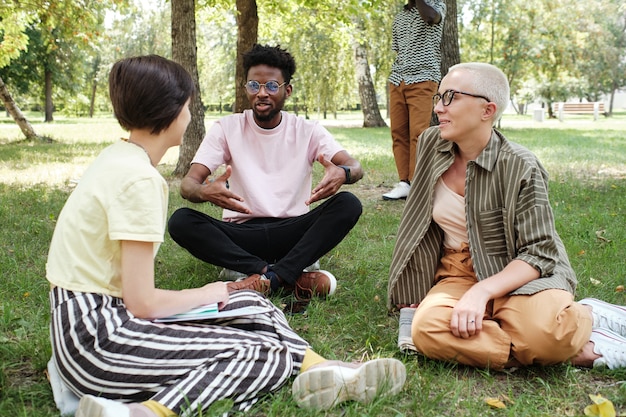The Science of Connection: Relationship Psychology in 2025

The Science of Connection in 2025 explores the evolving psychological factors influencing relationship building, focusing on technology’s role, the importance of authenticity, and strategies for fostering meaningful connections in an increasingly digital world.
In an increasingly digital world, understanding the psychology behind relationship building is more crucial than ever. The Science of Connection: Understanding the Psychology of Relationship Building in 2025 delves into how technology, authenticity, and evolving social norms are shaping our interactions and connections.
The Evolving Landscape of Human Connection
Human connection is fundamental to our well-being, yet the ways we form and maintain relationships are constantly evolving. Understanding these shifts is crucial for navigating the complexities of modern life and fostering meaningful bonds.
The Impact of Digital Communication
Digital communication has revolutionized how we interact, offering unparalleled convenience and accessibility. However, it also presents challenges in terms of authenticity and emotional depth.
- Maintaining genuine connections through screens.
- Navigating the nuances of online communication.
- Balancing digital interactions with face-to-face encounters.
The rise of social media and virtual platforms has blurred the lines between online and offline relationships, requiring us to adapt our communication strategies to maintain authentic connections.

The Psychology of Online Interactions
Online interactions differ significantly from face-to-face communication, influencing how we perceive and connect with others. Understanding these psychological dynamics is key to fostering healthy digital relationships.
Building Trust in a Virtual World
Trust is the cornerstone of any strong relationship. In the online realm, building and maintaining trust requires transparency, consistency, and active engagement.
- Strategies for verifying online identities and intentions.
- The role of vulnerability in fostering trust.
- Addressing concerns about privacy and security.
Cultivating trust online involves creating a safe and supportive environment where individuals feel comfortable sharing their thoughts and feelings.
The Role of Authenticity in Modern Relationships
In an era of curated online personas, authenticity stands out as a vital component of genuine connection. Embracing vulnerability and expressing one’s true self can foster deeper and more fulfilling relationships.
The Power of Vulnerability
Vulnerability involves showing up as your true self, including your imperfections and insecurities. This authenticity can create a safe space for others to do the same.
Being vulnerable allows for more profound emotional connections and fosters a sense of intimacy that is essential for long-lasting relationships.
Technology’s Shifting Role
Technology significantly impacts relationship dynamics through digital communication tools and platforms. While it offers convenience, it also presents challenges in maintaining genuine connections.
AI and Relationship Support
Artificial intelligence and chatbots are poised to assist in relationship maintenance, providing reminders, suggesting thoughtful gestures, and offering communication prompts.
Although AI cannot replace human interaction, it can supplement human efforts, helping partners stay connected and engaged in their relationship.
Communication and Empathy in 2025
Effective communication and empathy are fundamental to strong relationships. By actively listening and understanding each other’s perspectives, individuals can navigate conflicts and deepen their emotional bonds.

Building Empathy Through Active Listening
Active listening involves fully concentrating on what the other person is saying, understanding their message, responding thoughtfully, and remembering the information later.
By practicing active listening, individuals can demonstrate empathy and create a supportive environment for open and honest communication.
The Future of Intimacy
Intimacy, both emotional and physical, evolves with changing societal norms and technological advancements. Understanding these shifts is essential for cultivating fulfilling and meaningful relationships.
Redefining Expectations
The rise of diverse relationship models, such as polyamory and open relationships, challenges traditional notions of intimacy and commitment. Individuals are increasingly exploring models that better align with their values and needs.
Navigating these evolving expectations requires open communication, mutual respect, and a willingness to adapt to each other’s needs and desires.
Overcoming Challenges
All relationships face challenges, but successful couples develop strategies to navigate these hurdles and emerge stronger. Communication, conflict-resolution skills, and a willingness to seek help are essential for overcoming obstacles.
Seeking Professional Relationship Guidance
Therapy and counseling can provide valuable tools and insights for couples facing challenges. A skilled therapist can help partners identify patterns of conflict, improve communication skills, and develop strategies for strengthening their bond.
Seeking professional help is a sign of strength and a commitment to the relationship, rather than a sign of failure.
Navigating the evolving landscape of human connection requires a blend of empathy, communication skills, and adaptability. By embracing new tools and approaches, individuals can cultivate deeper and more fulfilling relationships in the years to come.
| Key Point | Brief Description |
|---|---|
| 🌐 Digital Impact | Technology shapes interactions, requiring focus on genuine online connections. |
| ❤️🩹 Authenticity | Be true to yourself and accept vulnerability to forge meaningful relationships. |
| 🗣️ Communication | Practice active listening and display empathy for effective interactions. |
| 🛠️ Relationship Support | Therapy helps couples to navigate problems and strengthen connections. |
Frequently Asked Questions
▼
Technology greatly affects relationships by altering contact patterns and affecting intimacy levels, making it necessary to be careful in managing digital interactions to build trust.
▼
Authenticity fosters more authentic, deeper, and more emotionally fulfilling relationships by allowing for true personal exposure, which establishes genuine connections and a sense of trust.
▼
Through improved understanding and emotional bonds, empathy enhances mutual development through active listening and consideration of other people’s perspectives, making relationships stronger and supportive.
▼
Online communication can pose challenges such as misinterpretation and absence of nonverbal cues, which makes it critical to practice clear communication and seek verification to avoid misunderstandings and cultivate trust.
▼
Conflict resolution is aided by open communication, active listening, and seeking professional counsel when needed. This results in stronger and more fulfilling relationships because it allows partners to address issues and promotes understanding.
Conclusion
Understanding the science of connection allows us to navigate the future of relationship building effectively. Through embracing authenticity, utilizing technology wisely, and prioritizing empathy and communication, we can build deeper and more meaningful relationships now and in 2025.





